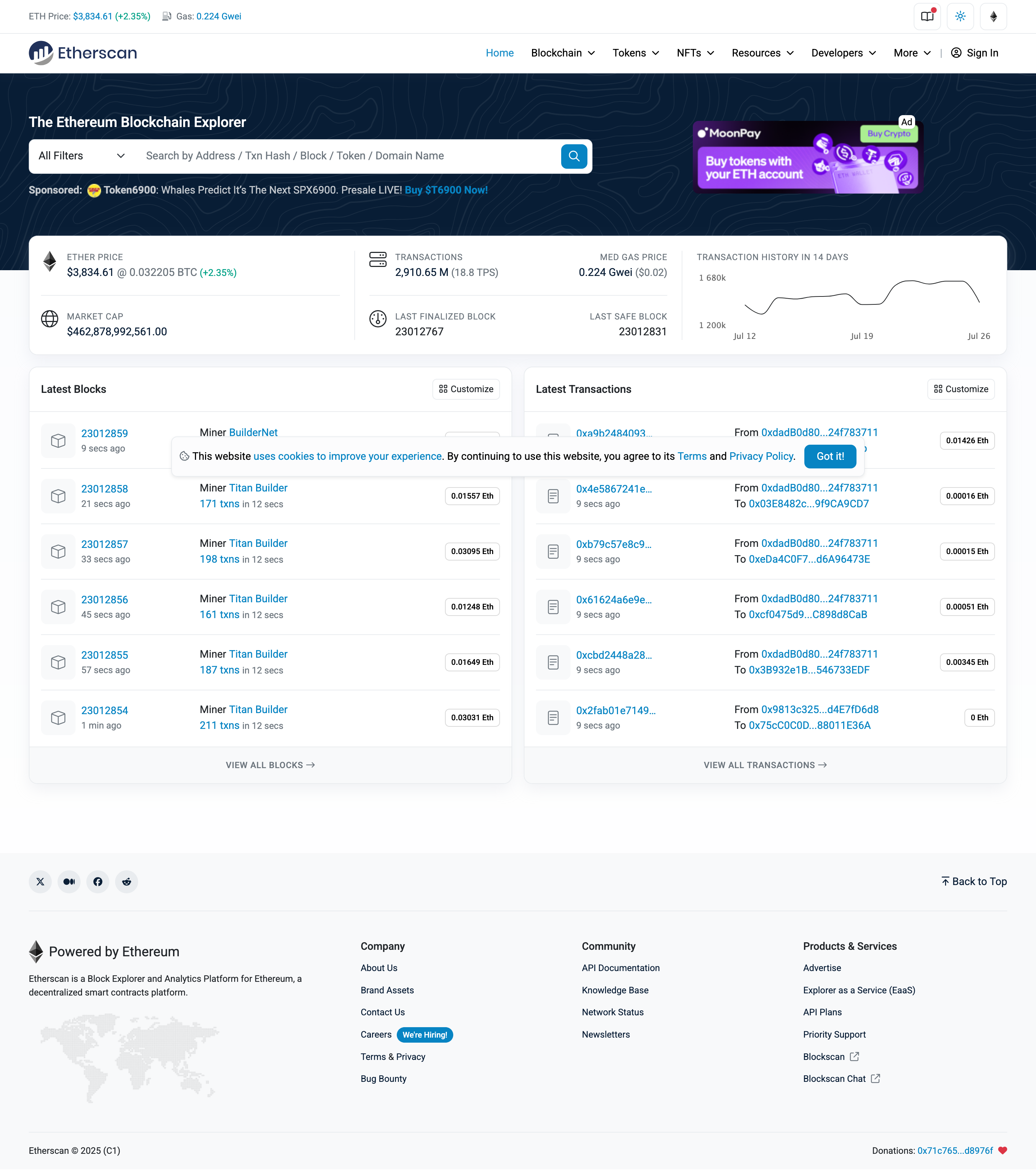
Etherscan: The Ultimate Guide to Ethereum’s Blockchain ExplorerIn the world of blockchain and cryptocurrency, transparency, accessibility, and accountability are paramount. As Ethereum continues to be a leading platform for decentralized applications (dApps), smart contracts, and digital assets, tools that enable users to interact with and understand the blockchain are more important than ever. One such tool, and arguably the most essential for Ethereum, is Etherscan.Etherscan is the most widely used blockchain explorer for the Ethereum network. It allows users to search, track, and verify transactions, addresses, smart contracts, token movements, and more. This article explores what Etherscan is, how it works, its features, why it's important, and how users can make the most of it.What is Etherscan?
Etherscan.io, commonly known simply as Etherscan, is a blockchain explorer and analytics platform designed for the Ethereum blockchain. It is a free, public resource that enables users to access all on-chain data recorded on Ethereum. From the moment a transaction is initiated on the Ethereum network, it becomes publicly viewable via Etherscan.Launched in 2015 by Matthew Tan and his team, Etherscan has become one of the most trusted tools in the Ethereum ecosystem. It is independent and not affiliated with the Ethereum Foundation or any particular project, maintaining a neutral stance as a data provider.How Does Etherscan Work?
Etherscan acts as a search engine for the Ethereum blockchain. It connects to Ethereum nodes to monitor and index the data on the blockchain in real time. This includes:Wallet balancesToken transfersSmart contract deployment and interactionGas usage and transaction feesBlock mining statisticsUsers can input various identifiers such as transaction hashes, wallet addresses, token names, or contract addresses to view detailed information. Etherscan translates raw blockchain data into a user-friendly format, making Ethereum accessible even to non-technical users.Key Features of Etherscan
1. Transaction Tracker
At the heart of Etherscan is its transaction lookup tool. Users can enter a transaction hash to view:Status (Pending, Success, or Failed)Gas price and gas limitBlock number and timestampValue transferred (in ETH or tokens)Sender and recipient addressesSmart contract interactions (if applicable)This feature is widely used to confirm whether a transaction has been completed and to understand the exact on-chain activity.2. Wallet Address Explorer
Etherscan allows users to input any Ethereum address to view:ETH balanceToken balances (ERC-20, ERC-721, ERC-1155)Transaction historyInternal transactions (smart contract-triggered)ENS (Ethereum Name Service) associationsThis makes it a vital tool for traders, researchers, and analysts.3. Token and Contract Explorer
Ethereum supports a wide range of tokens and smart contracts. Etherscan offers:Token details (total supply, holders, transfers)Smart contract source code (if verified)Contract interaction historyRead/Write contract functions via the interfaceUsers can verify contract authenticity and interact directly with smart contracts through Etherscan, even without using a front-end dApp.4. NFT Support
Etherscan supports NFTs via ERC-721 and ERC-1155 token standards. Users can:View NFT metadata and ownership historySee minting detailsTrack NFT transfers between walletsWhile Etherscan does not provide rich visuals like NFT marketplaces, it offers accurate ownership and provenance data.5. Gas Tracker
Ethereum users often worry about gas fees. Etherscan’s Gas Tracker provides:Current average, low, and high gas pricesEstimated transaction confirmation timesHistorical gas fee dataCommon gas-hungry contracts and dAppsThis helps users time their transactions to minimize costs.6. Block and Mempool Explorer
Etherscan lets users inspect:The latest mined blocksTransactions waiting in the mempoolMining rewards and block confirmationsThis is especially useful for developers and node operators.
Benefits of Using Etherscan
Transparency
Etherscan enables anyone to audit the blockchain. Whether you’re verifying a donation, following DeFi activity, or inspecting wallet balances, it's all publicly available.Security and Verification
Etherscan can verify if a smart contract’s source code is published and matches the deployed bytecode. Verified contracts reduce the risk of interacting with malicious code.Accessibility
You don’t need to install any software or plugins. Etherscan is browser-based and entirely free to use.Developer Tools
Etherscan provides APIs for developers to build custom applications and integrations using real-time Ethereum data.Educational Resource
With its detailed views of transactions, gas fees, and token movements, Etherscan serves as an excellent learning tool for anyone new to Ethereum.Etherscan vs. Other Explorers
While Etherscan is the most popular, alternatives include:Blockchair – Multi-chain explorer with comparative analyticsEthplorer – Focused on token transactions and portfolio trackingBloxy – Offers advanced analytics and DeFi statsZapper – DeFi dashboard that uses Etherscan data under the hoodDespite alternatives, Etherscan remains the most trusted and feature-complete Ethereum explorer.Common Use Cases
Check if a transaction is confirmedTrack wallet activityVerify a token or contract before investingAudit DeFi protocol interactionsCheck NFT mint and ownership historyInspect smart contract codeMonitor gas prices to save on feesPrivacy Considerations
Blockchain data is public by design, and Etherscan does not reveal anything that isn’t already on the blockchain. However, users should avoid linking their wallet addresses to their real-world identities if privacy is a concern.Tips for Using Etherscan
Bookmark your wallet or favorite tokens for easy access.Use the “Watch List” feature by creating a free account.Always verify smart contracts before interacting directly through Etherscan.Check token holder distribution to identify potential rug-pulls or whales.Use filters in transaction history for faster navigation.The Role of Etherscan in Web3
As Ethereum grows in complexity with rollups, Layer-2s, and sharding, the importance of tools like Etherscan only increases. Users need reliable ways to navigate these systems, and developers need data transparency to build decentralized applications responsibly.Etherscan is more than just a tool—it’s a public infrastructure piece of Ethereum, enabling open access and fostering trust in the system.Conclusion
Etherscan is a foundational pillar in the Ethereum ecosystem. By offering real-time access to all blockchain data, it empowers users to explore, verify, and understand Ethereum like never before. Whether you're a casual user checking your wallet, a developer debugging a smart contract, or an analyst tracking token flows, Etherscan provides the tools and clarity you need.In an environment where transparency and trust are essential, Etherscan remains the gold standard for blockchain explorers on Ethereum. As the Web3 space continues to evolve, Etherscan will likely remain a vital gateway to on-chain knowledge and accountability.